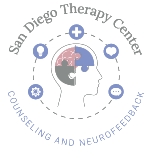What Are The Signs of Trauma in a Child?

The staff at SDCFT understands that many of us experience trying times during our lifetime and reaching out for help may be difficult. We would like to help make this transition as easy as possible and in a caring and supportive environment, so that healing can begin.
How do I know if my child was exposed to a traumatic event?
A significant number of children in our modern, American society are exposed to traumatic events. A traumatic event is one that threatens injury, death, or the physical integrity of self or others and also causes horror, terror, or helplessness at the time it occurs. Traumatic events include sexual abuse, domestic violence, community and school violence, medical trauma, motor vehicle accidents, acts of terrorism, war experience, natural and human-made disasters, suicides, and other traumatic losses.
Recognize the signs and symptoms of trauma in children
A significant number of children in our modern, American society are exposed to traumatic events. A If your child has been exposed to a traumatic experience, such as domestic violence or abuse, your child may need some help in coping with the trauma. The first step is to recognize the signs of trauma. Frequently, children become sad, worried, angry, frightened, or withdrawn. Although there are many possible responses and no child will respond the same way, other signs of trauma can include:
- Trouble sleeping or falling asleep, nightmares or unwanted memories of the event
- Problems concentrating or paying attention
- Difficulty getting along with others, less social
- Change in appetite
- Behaving younger than they are, bedwetting, clingy, thumb-sucking
- Anger or emotional outbursts
- Avoidance of people, places or things
- Nervousness
- Depression
- Problems at school
- Bullying
- Not communicating openly
The importance of getting help
Children who have experienced an initial traumatic event before 11 years old are 3 times more likely to develop psychological symptoms than people who experience their first trauma as an adult. Child therapy is important because it is an opportunity for children to learn how to regulate their emotions and understand the connection between their emotions and behaviors in order to have more control over them.
Traumatic experiences can damage a child if left unspoken about and untreated. Help for children who have experience a traumatic event should begin as soon as possible after the event has occurred. Therapy is important to identify how the child is coping with the trauma, to understand that their silence doesn’t necessarily mean that they have not been affected and to provide support, reassurance and healing.



